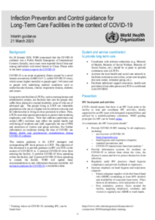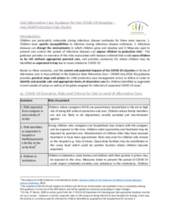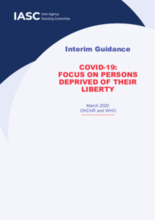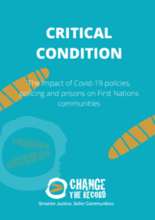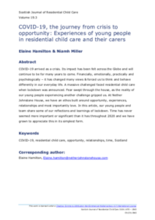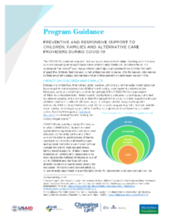This section includes resources and tools related to alternative care during the COVID-19 pandemic.
Displaying 151 - 160 of 185
On this webpage, CAFO has created a central place to collect information that might be helpful to members of the faith community as they advocate for children and families in their communities.
This interim guidance is for Long-term care facility (LTCF) managers and corresponding infection prevention and control (IPC) focal persons in LTCF. The objective of this document is to provide guidance on IPC in LTCFs in the context of COVID-19 to 1) prevent COVID-19-virus from entering the facility, 2) prevent COVID-19 from spreading within the facility, and 3) prevent COVID-19 from spreading to outside the facility.
This guidance is to support the management of children and young people living in children's homes, residential special schools and colleges, and other residential facilities during the COVID-19 crisis.
This guidance provides an overview of the risks associated with COVID-19 outbreak that could cause children to be left without appropriate parental care, and provides scenarios for where children may be identified as separated in Iraq due to issues related to COVID-19.
This article from the Children's Bureau of the U.S. Administration for Children and Families provides information and resources on the COVID-19 crisis for child welfare workers, children involved in the child welfare system, foster care providers, and more.
This factsheet from Generations United provides grandparents who are raising grandchildren with resources and information on how to stay healthy, informed and connected in light of the COVID-19 pandemic.
The series of messages in this guidance aim at addressing the specific issues of persons deprived of their liberty during the COVID-19 pandemic, including children, with the responsible services and ministries.
This report from Change the Record aims to provide an Australian national overview of the Critical Condition of First Nations communities during Covid-19. The report includes evidence on the impacts of the COVID-19 crisis on children in detention centers as well as children in out-of-home care and their families.
In this article, the young people and team at the Nether Johnstone House in Scotland share some of their reflections and learnings of lockdown.
This brief from Changing the Way We Care uses an ecological framework to help illustrate how the COVID-19 crisis might impact the children, families and communities and how to help programs adapt, reorganize and prioritize prevention and response activities.

